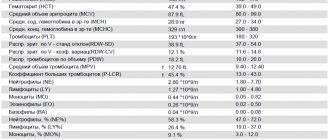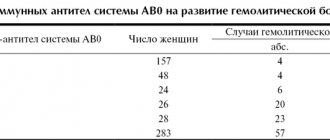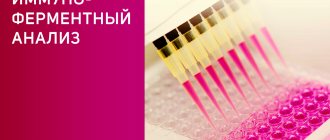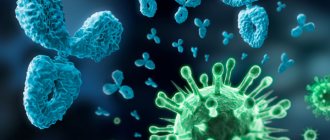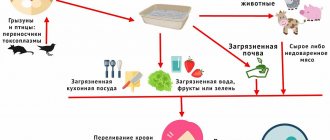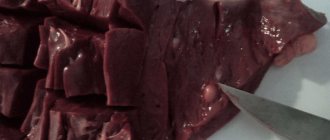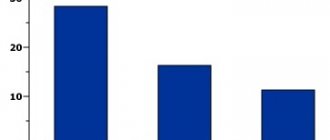The level of antibodies to the thyroglobulin protein is normally insignificant, since they are formed as a reaction of the body’s immune system to contact with thyroglobulin. Typically, this colloidal protein is located in the enclosed space of the follicle and does not provoke the formation of antibodies. The reason for exceeding the norm for antibodies to thyroglobulin may be damage to the follicle and the release of a significant amount of thyroglobulin into the blood. Then, in the results of tests for antibodies to thyroglobulin, increased values are recorded.
Diseases of the thyroid gland that require testing for elevated thyroglobulin
An analysis for elevated thyroglobulin is done in the following cases:
• For thyroid carcinoma. But it should be remembered that only a third of patients with thyroid cancer have an increase in the concentration of this protein;
• For the purpose of early detection of metastases or relapses of tumors after surgical treatment has already been performed. A relapse of both malignant and benign thyroid tumors may be indicated by increased thyroglobulin in the blood plasma;
• Determination of the effectiveness of radioactive iodine therapy for the metastatic process in thyroid tumors;
• For the diagnosis of artificial thyrotoxicosis (against the background of hormone replacement treatment);
• Thyroglobulin, the norm of which is increased, is assessed in children to determine the origin of congenital hyperfunction of the thyroid gland;
• As a tumor marker and a means for assessing the effectiveness of treatment of thyroid tumors;
• To assess the activity of thyroiditis or confirm previous inflammation of the thyroid gland in the next 2 years;
• For mass studies in conditions of iodine deficiency.
Thyroglobulin as a tumor marker
At the Northwestern Endocrinology Center, a blood test for thyroglobulin is not prescribed during the initial examination. We are well versed in thyroid diseases and we care about our reputation, so we try to save our patients money and not waste it.
At the same time, if you look at the number of thyroglobulin tests that the Northwestern Endocrinology Center performs annually, we are now among the Russian leaders in the number of such tests. The thing is that our center is the Russian leader in the treatment of differentiated thyroid cancer - papillary and follicular. Every year, the center performs about 700-800 operations for thyroid cancer, and several tens of thousands of patients who have been treated previously are under observation. And for all these people, thyroglobulin is the main indicator. All these patients donate blood for analysis annually or even somewhat more often, and each time for them it is stress, it is an expectation - is thyroglobulin elevated or not? And in this group of patients, thyroglobulin is really a tumor marker, since the thyroid gland and tumor had already been removed earlier, then many patients were treated with radioactive iodine to destroy even the smallest remnants of the gland and tumor tissue.
After successful treatment of differentiated thyroid cancer, the blood thyroglobulin level should not exceed 2 ng/ml
(against the background of a three-week withdrawal from thyroxine), if radioiodine therapy was previously carried out, and
5 ng/ml
if radioiodine therapy was not carried out. Of course, the lower the thyroglobulin, the better, but the level, even after successful treatment of the tumor, is rarely completely zero. The sensitive 3rd generation analyzers that we use even the smallest amounts of thyroglobulin in the blood, so its level in the blood is almost always just above zero.
When are antibodies to thyroglobulin elevated?
• If antibodies to thyroid peroxidase and thyroglobulin are elevated, Hashimoto's chronic thyroiditis may be the cause.
• Antibodies to thyroglobulin are elevated during autoimmune inflammation of the gland tissue - thyroiditis.
• Hypothyroidism without a clearly identified cause, or idiopathic hypothyroidism, can also be manifested by increased antibodies in the blood.
• Antibodies to thyroglobulin can also be elevated in diffuse toxic goiter (Graves' disease).
Detection of autoantibodies to thyroid-stimulating hormone receptors in blood serum, used to diagnose Graves' disease (Graves' disease), autoimmune thyroiditis, as well as transient dysfunction of the thyroid gland in newborns.
Synonyms Russian
Autoantibodies to thyroid-stimulating hormone receptors, thyroid-stimulating immunoglobulin.
English synonyms
Thyroid-stimulating immunoglobulins, TSIs, Thyroid-stimulating hormone receptor antibodies, TSH receptor antibodies, TSHRAbs, TSH binding inhibitor immunoglobulin, TBII.
Research method
Electrochemiluminescent immunoassay (ECLIA).
Determination range: 0.3 - 40 IU/l.
Units
IU/L (international unit per liter).
What biomaterial can be used for research?
Venous blood.
How to properly prepare for research?
Do not smoke for 30 minutes before the test.
General information about the study
Antibodies to TSH receptors (anti-tSH) are a heterogeneous group of autoantibodies that interact with the thyroid stimulating hormone (TSH) receptors of the thyroid gland. Based on their effect on thyroid function, anti-pTTH is divided into stimulating and blocking antibodies. Stimulating anti-pTTHs greatly enhance thyroid function, leading to diffuse goiter and hyperthyroidism. Anti-pTTH blockers interfere with the action of TSH and lead to thyroid atrophy and hypothyroidism. Anti-rTSH are predominantly immunoglobulins of the IgG class and penetrate the placental barrier. Both variants can be detected simultaneously in the blood of the same patient. They are the direct cause of Graves' disease and autoimmune thyroiditis, as well as transient thyroid dysfunction in newborns. A test for antibodies to TSH receptors is a diagnostic test that detects both stimulating and blocking antibodies in the blood.
Anti-rTSH is a clinical and laboratory marker of Graves' disease and is studied in the differential diagnosis of hyperthyroidism syndrome. The presence of anti-rTSH is not typical for other causes of hyperthyroidism, such as toxic nodular goiter, granulomatous thyroiditis, or administration of exogenous thyroxine. Stimulating anti-rTSHs are found in 85-100% of patients with Graves' disease and can serve as a diagnostic criterion. Anti-rTSH concentration reflects disease activity and is associated with the severity of ophthalmopathy. The significance of this test is especially great if the disease has an atypical clinical picture: signs of hyperthyroidism, vaguely palpable goiter, ophthalmopathy against the background of euthyroidism, unilateral ophthalmopathy. The concentration of anti-rTSH decreases when antithyroid drugs are prescribed, and a high rate of titer decline indicates a good response to treatment. The dynamics of anti-rTSH may serve as a basis for adjustment of therapy, including complete withdrawal of antithyroid drugs. In 75-96% of cases of Graves' disease, blocking anti-rTSH is also found. It should be noted that anti-rTSH is not a strictly specific finding for Graves' disease and may also be found in 10-15% of patients with Hashimoto's autoimmune thyroiditis.
The anti-rTSH test plays an important role in the diagnosis of Graves' disease in pregnant women. The danger of Graves' disease during pregnancy is that anti-rTSH crosses the placental barrier and leads to hyperthyroidism in the newborn. Radionuclide scanning of the thyroid gland, one of the main ways to diagnose Graves' disease, is not prescribed to pregnant women. In this situation, anti-rTSH testing is a good alternative to thyroid scintigraphy. Anti-rTSH concentrations are measured in pregnant women with a history of surgery for Graves' disease or radioactive iodine treatment, and in women receiving antithyroid drugs during pregnancy. Like stimulating anti-rTSH, blocking antibodies cross the placenta and can cause transient hypothyroidism in the newborn. For timely diagnosis of autoimmune hypothyroidism in pregnant women, an anti-rTSH test is performed.
In half of the cases of Graves' disease, a relapse of the disease occurs after completing a course of thyreostatic drugs. When assessing the prognosis of relapse, several parameters are used, such as the size of the goiter, the age and gender of the patient, the presence of ophthalmopathy and the level of anti-rTSH. High levels of anti-rTSH are considered to be an unfavorable prognostic factor.
Graves' disease and autoimmune thyroiditis may coexist with other autoimmune conditions such as systemic lupus erythematosus, pernicious anemia, and rheumatoid arthritis. Therefore, if the anti-rTSH test result is positive and autoimmune thyroid disease is diagnosed, it is recommended to conduct additional laboratory tests to exclude concomitant pathology.
What is the research used for?
- For differential diagnosis of hyper- and hypothyroidism syndrome.
- To monitor the treatment of relapse of Graves' disease and make its prognosis.
- To predict the development of transient thyroid dysfunction in newborns.
When is the study scheduled?
- For symptoms of hyperthyroidism: irritability, restlessness, tremor, feeling of irregular heartbeat, oligoamenorrhea, weight loss despite increased appetite, sensitivity to heat, especially in the presence of ophthalmopathy (exophthalmos) and pretibial myxedema of the skin.
- With an atypical clinical picture of Graves' disease: unexpressed signs of hyperthyroidism, vaguely palpable goiter, ophthalmopathy against the background of euthyroidism, unilateral ophthalmopathy.
- For symptoms of hypothyroidism: weakness, drowsiness, impaired concentration and memory, weight gain despite decreased appetite, increased sensitivity to cold, etc.
- When examining pregnant women with a history of surgical treatment of Graves' disease or treatment with radioactive iodine, as well as pregnant women receiving thyreostatic drugs.
- When examining pregnant women with signs of hypothyroidism.
What do the results mean?
Reference values
| Result | |
| ≤ 1.75 IU/l | negative |
| > 1.75 IU/l | positive |
Reasons for the positive result:
- Graves' disease (Bazedow);
- autoimmune thyroiditis.
Reasons for negative results:
- absence of autoimmune thyroid diseases;
- disease control during treatment.
What can influence the result?
- The concentration of anti-rTSH decreases due to the use of thyrotoxic drugs.
Detailed description of the study
The thyroid gland is the most important endocrine organ in humans. Its function is regulated by thyroid-stimulating hormone (TSH), which is secreted by a tiny gland at the base of the brain - the pituitary gland. TSH blocks the production of excess thyroid hormones.
Immune cells typically produce antibodies designed to fight viruses, bacteria or other foreign substances. When the immune system is disrupted, antibodies to TSH hormone receptors are detected. The release of antibodies to the TSH receptor leads to excess production of thyroid hormones, that is, hyperthyroidism. The result is a disease called diffuse toxic goiter, or Graves' disease.
This disease can affect people of both sexes and different ages, but is more common in women under 40 years of age.
Predisposition to diffuse toxic goiter can be inherited. Smoking and severe stress are provoking factors for the development of this disease. There is also an increased risk of developing Graves' disease in pregnant and postpartum women.
Symptoms of Graves' disease include:
- Restlessness and irritability;
- Trembling in hands;
- Intolerance to high temperatures;
- Increased sweating;
- Weight loss despite normal nutrition;
- Enlargement of the thyroid gland (goiter);
- Menstrual irregularities;
- Erectile dysfunction or decreased libido;
- Diarrhea;
- Puffy eyes (Graves' ophthalmopathy);
- Redness of the skin on the legs or feet (Graves' dermopathy);
- Cardiopalmus;
- Sleep disturbance.
A long course of the disease leads to disturbances in the functioning of the heart, decreased bone density and some other complications, so timely detection and treatment of diffuse toxic goiter is necessary.
Determining the level of antibodies to TSH receptors is an important test for identifying Graves' disease. An increase in the number of these antibodies serves as a characteristic sign of this disease, allowing for differential diagnosis with other pathologies of the thyroid gland.
Antibodies to the TSH receptor (anti-pTTH)
Detection of autoantibodies to the thyroid-stimulating hormone receptor in blood serum, used to diagnose Graves' disease (Graves' disease), autoimmune thyroiditis, as well as transient dysfunction of the thyroid gland in newborns.
Synonyms Russian
Autoantibodies to thyroid-stimulating hormone receptors, thyroid-stimulating immunoglobulin.
English synonyms
Thyroid-stimulating immunoglobulins, TSIs, Thyroid-stimulating hormone receptor antibodies, TSH receptor antibodies, TSHRAbs, TSH binding inhibitor immunoglobulin, TBII.
Research method
Enzyme-linked immunosorbent assay (ELISA).
Units
IU/L (international unit per liter).
What biomaterial can be used for research?
Venous blood.
How to properly prepare for research?
Do not smoke for 30 minutes before donating blood.
General information about the study
Anti-TSH receptor antibodies (anti-rTTH) are a heterogeneous group of autoantibodies that interact with the thyroid stimulating hormone (TSH) receptors of the thyroid gland. Based on their effect on thyroid function, anti-pTTH is divided into stimulating and blocking antibodies. Stimulating anti-pTTHs greatly enhance thyroid function, leading to diffuse goiter and hyperthyroidism. Anti-pTTH blockers interfere with the action of TSH and lead to thyroid atrophy and hypothyroidism. Anti-TSH are predominantly classified as immunoglobulins of the IgG class and penetrate the placental barrier. Both variants can be detected simultaneously in the blood of the same patient. They are the direct cause of Graves' disease and autoimmune thyroiditis, as well as transient thyroid dysfunction in newborns. A test for antibodies to the TSH receptor is a diagnostic test that detects both stimulating and blocking antibodies in the blood.
Anti-TSH are a clinical and laboratory marker of Graves' disease and are studied in the differential diagnosis of hyperthyroidism syndrome. The presence of anti-TSH is not typical for other causes of hyperthyroidism, such as toxic nodular goiter, granulomatous thyroiditis, or administration of exogenous thyroxine. Stimulating anti-rTSHs are found in 85-100% of patients with Graves' disease and can serve as a diagnostic criterion. The anti-TSH concentration reflects disease activity and is associated with the severity of ophthalmopathy. The significance of this test is especially great if the disease has an atypical clinical picture: signs of hyperthyroidism, vaguely palpable goiter, ophthalmopathy against the background of euthyroidism, unilateral ophthalmopathy. The anti-TSH concentration decreases when antithyroid drugs are prescribed, and a high rate of titer decline indicates a good response to treatment. The dynamics of anti-TSH may serve as a basis for adjustment of therapy, including complete withdrawal of antithyroid drugs. In 75-96% of cases of Graves' disease, blocking anti-rTSH is also found. It should be noted that anti-rTSH is not strictly specific for Graves' disease and may also be found in 10-15% of patients with autoimmune Hashimoto's thyroiditis.
Anti-rTSH testing plays an important role in the diagnosis of Graves' disease in pregnant women. The danger of Graves' disease during pregnancy is that anti-rTSH crosses the placental barrier and leads to hyperthyroidism in the newborn. Radionuclide scanning of the thyroid gland, one of the main ways to diagnose Graves' disease, is not prescribed to pregnant women. In this situation, anti-TSH testing is a good alternative to thyroid scintigraphy. Anti-rTSH concentrations are measured in pregnant women with a history of surgery for Graves' disease or radioactive iodine treatment, and in women receiving antithyroid drugs during pregnancy. Like stimulating anti-TSH, blocking antibodies cross the placenta and can cause transient hypothyroidism in the newborn. For timely diagnosis of autoimmune hypothyroidism in pregnant women, an anti-TSH test is performed.
In half of the cases of Graves' disease, a relapse of the disease occurs after completing a course of thyreostatic drugs. When assessing the prognosis of relapse, several parameters are used, such as the size of the goiter, the age and gender of the patient, the presence of ophthalmopathy and the level of anti-TSH. A high anti-TSH level is considered an unfavorable prognostic factor.
Graves' disease and autoimmune thyroiditis may coexist with other autoimmune conditions such as systemic lupus erythematosus, pernicious anemia, and rheumatoid arthritis. Therefore, if the anti-rTSH test result is positive and autoimmune thyroid disease is diagnosed, it is recommended to conduct additional laboratory tests to exclude concomitant pathology.
What is the research used for?
- For differential diagnosis of hyper- and hypothyroidism syndrome.
- To monitor the treatment of relapse of Graves' disease and make its prognosis.
- To predict the development of transient thyroid dysfunction in newborns.
When is the study scheduled?
- For symptoms of hyperthyroidism: irritability, restlessness, tremor, feeling of irregular heartbeat, oligoamenorrhea, weight loss despite increased appetite, sensitivity to heat, especially in the presence of ophthalmopathy (exophthalmos) and pretibial myxedema of the skin.
- With an atypical clinical picture of Graves' disease: unexpressed signs of hyperthyroidism, vaguely palpable goiter, ophthalmopathy against the background of euthyroidism, unilateral ophthalmopathy.
- For symptoms of hypothyroidism: weakness, drowsiness, impaired concentration and memory, weight gain despite decreased appetite, increased sensitivity to cold, etc.
- When examining pregnant women with a history of surgical treatment of Graves' disease or treatment with radioactive iodine, as well as pregnant women receiving thyreostatic drugs.
- When examining pregnant women with signs of hypothyroidism.
What do the results mean?
Reference values: 0 - 0.99 IU/l.
Reasons for the positive result:
- Graves' disease (Graves's disease);
- autoimmune thyroiditis.
Reasons for negative results:
- absence of autoimmune thyroid diseases;
- disease control during treatment;
- incorrect blood collection for testing.
What can influence the result?
- The concentration of anti-TSH decreases due to the use of thyrotoxic drugs.
Important Notes
- The result of the study should be interpreted taking into account additional clinical, laboratory and instrumental data.
- A negative result does not completely exclude the disease.
Also recommended
- Thyroid-stimulating hormone (TSH)
- Free thyroxine (free T4)
- Free triiodothyronine (free T3)
- Total thyroxine (T4)
- Total triiodothyronine (T3)
- Antibodies to thyroid peroxidase (anti-TPO)
- Antithyroglobulin antibodies (antiTG)
- Detailed laboratory examination of the thyroid gland
- Thyroid function
Who orders the study?
Endocrinologist, general practitioner, cardiologist.
Literature
- Cho BY. Clinical applications of TSH receptor antibodies in thyroid diseases. J Korean Med Sci. 2002 Jun;17(3):293-301.
- Michalek K, Morshed SA, Latif R, Davies TF. TSH receptor autoantibodies. Autoimmun Rev. 2009 Dec;9(2):113-6.
- Fauci et al. Harrison's Principles of Internal Medicine/A. Fauci, D. Kasper, D. Longo, E. Braunwald, S. Hauser, J. L. Jameson, J. Loscalzo; 17 ed. – The McGraw-Hill Companies, 2008.
- Chernecky CC Laboratory Tests and Diagnostic Procedures / S.S. Chernecky, V.J. Berger; 5th ed. – Saunder Elsevier, 2008.
Bibliography
- Lapin S.V. Totolyan A.A. Immunological laboratory diagnosis of autoimmune diseases. Publishing house "Man", St. Petersburg - 2010
- Tietz Clinical guide to laboratory tests. 4th ed. Ed. Wu ANB- USA, WB Sounders Company, 2006, 1798 p.
- Conrad K, Schlosler W., Hiepe F., Fitzler MJ Autoantibodies in Organ Specific Autoimmune Diseases: A Diagnostic Reference/PABST, Dresden – 2011.
- Conrad K, Schlosler W., Hiepe F., Fitzler MJ Autoantibodies in Systemic Autoimmune Diseases: A Diagnostic Reference/PABST, Dresden – 2007.
- Gershvin ME, Meroni PL, Shoenfeld Y. Autoantibodies 2nd ed./ Elsevier Science – 2006.
- Shoenfeld Y., Cervera R, Gershvin ME Diagnostic Criteria in Autoimmune Diseases / Humana Press – 2008.
- Tozzoli, R., Bagnasco, M., & Villalta, D. Thyrotropin Receptor Antibodies / Autoantibodies, 375–383 - 2014
- Weetman, A. P. (2014). Thyroid disease. / The Autoimmune Diseases, 557–574 - 2014.
- Test system manufacturer's instructions
